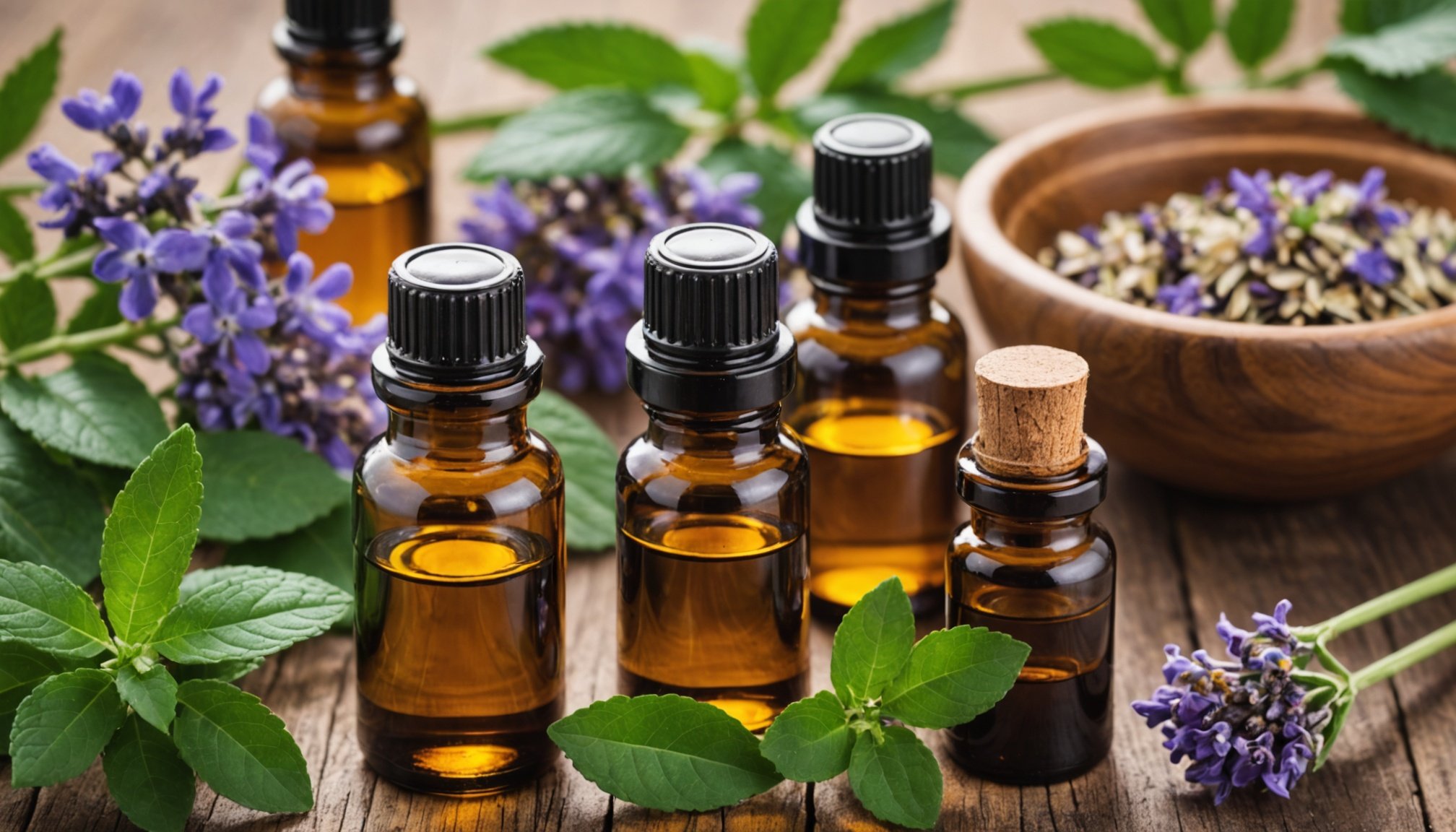Menopause can bring a host of challenging symptoms, often leaving women seeking effective relief. Essential oils have emerged as a popular natural alternative for alleviating discomfort associated with this life phase. With their unique properties and soothing aromas, many report positive experiences. This exploration delves into the potential benefits of essential oils, offering insights and solutions for managing menopause symptoms effectively. Discover how these aromatic wonders could provide the comfort you’ve been searching for.
Overview of Menopause Symptoms
Menopause is a natural phase in a woman's life that brings about a range of symptoms affecting both physical and emotional well-being. Understanding these changes is crucial for managing daily life effectively.
Also to discover : Understanding tear trough filler: causes and solutions explained
Common Symptoms
Women often experience hot flashes, night sweats, and sleep disturbances. These physical symptoms can disrupt daily activities and affect overall quality of life. Emotional symptoms such as mood swings, irritability, and anxiety are also prevalent, further complicating the transition.
Impact on Daily Life
The impact of menopause on daily life can be significant. Many women find it challenging to maintain their usual routines due to fatigue and discomfort. It is important to acknowledge these challenges and seek support when needed. This phase can also affect personal relationships, as mood changes and physical discomfort may influence interactions with others.
Also to see : Exploring the Impact of Forest Bathing on Stress Reduction: Unlocking Nature”s Calming Power
Exploring Remedies
Exploring alternative remedies can be beneficial for symptom relief. Options such as lifestyle changes, herbal supplements, and stress management techniques can offer relief. Consulting with healthcare professionals can provide guidance on effective strategies tailored to individual needs. By addressing menopause symptoms proactively, women can improve their well-being and navigate this life stage with greater ease.
Introduction to Essential Oils
Essential oils have been used for centuries, playing a vital role in aromatherapy and wellness. These concentrated plant extracts capture the essence of their source, providing a powerful tool for enhancing physical and emotional well-being.
Definition and History
Essential oils are volatile compounds extracted from plants, known for their aromatic properties and therapeutic benefits. Historically, they have been utilised in various cultures for their healing properties, from ancient Egyptian rituals to traditional Chinese medicine. Each oil carries unique characteristics and benefits, making them a versatile choice for holistic health practices.
Extraction Methods and Types
The extraction of essential oils involves several methods, with steam distillation being the most common. This process involves steaming plant material to release essential compounds, which are then condensed into oil form. Other methods include cold pressing, often used for citrus oils, and solvent extraction for delicate flowers. The type of plant and desired oil properties determine the method used, ensuring the purity and potency of the final product.
Role in Aromatherapy
Aromatherapy utilises essential oils to promote physical and emotional well-being. By inhaling or applying these oils, individuals can experience benefits such as relaxation, stress relief, and improved mood. Essential oils like lavender, peppermint, and eucalyptus are popular choices in aromatherapy, each offering distinct therapeutic effects.
Essential Oils for Hot Flashes
Hot flashes are a common symptom of menopause, and essential oils can offer natural relief. Certain oils, like clary sage and peppermint, are renowned for their ability to alleviate these sudden heat surges.
Specific Essential Oils
- Clary Sage: Known for its hormone-balancing properties, clary sage can help reduce the frequency and intensity of hot flashes. It works by influencing oestrogen levels, providing a cooling effect.
- Peppermint: This oil offers a refreshing sensation that can counteract the warmth of a hot flash. Its menthol content provides a cooling effect, making it a popular choice for immediate relief.
Scientific Support
Studies have shown that essential oils can be effective in managing menopausal symptoms. Research highlights that clary sage, in particular, can reduce cortisol levels, which are often elevated during hot flashes. This reduction in stress hormones can lead to fewer and less intense episodes.
Practical Application
To utilise essential oils for hot flashes, consider these methods:
- Diffusion: Add a few drops of your chosen oil to a diffuser to fill your space with its calming aroma.
- Topical Use: Dilute essential oils with a carrier oil and apply to pulse points for direct relief. Always perform a patch test to ensure no allergic reactions occur.
Essential Oils for Mood Swings
Mood swings are a challenging aspect of menopause, but essential oils can offer a natural way to help stabilize emotions. Certain oils, such as lavender and bergamot, are particularly effective in promoting emotional balance.
Essential Oils for Emotional Stability
- Lavender: Known for its calming properties, lavender oil can help reduce anxiety and promote relaxation. Its soothing aroma is often used to ease tension and improve mood.
- Bergamot: This citrus oil is celebrated for its uplifting effects. It can alleviate feelings of stress and sadness, making it a valuable tool for emotional well-being.
Research Findings on Aromatherapy
Research supports the use of aromatherapy for emotional stability. Studies indicate that inhaling essential oils like lavender can lead to significant reductions in anxiety and mood disturbances. The olfactory system's connection to the brain's emotional centres explains these effects, as scents can directly influence mood-regulating neurotransmitters.
Techniques for Mood Enhancement
To effectively use essential oils for mood swings, consider these techniques:
- Inhalation: Add a few drops of your chosen oil to a tissue or diffuser and inhale deeply.
- Bathing: Mix essential oils with Epsom salts and add to a warm bath for a relaxing experience.
- Massage: Combine oils with a carrier oil and massage onto the skin to enhance emotional well-being.
Essential Oils for Sleep Disturbances
Sleep disturbances are a prevalent concern during menopause, often resulting in fatigue and irritability. Fortunately, certain essential oils can promote relaxation and improve sleep quality, making them a valuable addition to bedtime routines.
Essential Oils for Better Sleep
-
Chamomile: Renowned for its calming properties, chamomile essential oil can help ease anxiety and promote restful sleep. Its gentle, soothing aroma prepares the mind and body for relaxation.
-
Vetiver: This oil is known for its grounding effects, helping to calm the nervous system and reduce restlessness. Vetiver's earthy scent is ideal for creating a tranquil sleep environment.
Recommended Practices
To incorporate essential oils into your bedtime routine, consider the following methods:
-
Diffusion: Add a few drops of your chosen essential oil to a diffuser in your bedroom. This will fill the space with a calming aroma, encouraging relaxation.
-
Pillow Spray: Mix essential oils with water in a spray bottle and lightly mist your pillow before bedtime. This practice can enhance the sleep environment and promote deeper rest.
-
Bath Ritual: Combine essential oils with Epsom salts for a warm, soothing bath before bed. This not only relaxes the muscles but also prepares the mind for sleep.
Safety Precautions and Usage Guidelines
When using essential oils, understanding safety precautions is crucial to avoid adverse effects and maximise benefits. Here are some general safety guidelines to follow.
General Safety Guidelines
Essential oils are potent and should be handled with care. Always store them in a cool, dark place, away from children and pets. When using a new oil, start with a small amount to gauge your body's reaction.
Potential Side Effects and Contraindications
While essential oils offer numerous benefits, they can cause side effects like skin irritation or allergic reactions. People with specific health conditions, such as asthma or epilepsy, should consult with a healthcare provider before use. Pregnant or breastfeeding women should also seek medical advice, as certain oils can be contraindicated.
Importance of Dilution and Patch Testing
Dilution is essential when applying essential oils topically. Mix a few drops with a carrier oil, such as coconut or jojoba, to reduce the risk of skin irritation. Always perform a patch test by applying the diluted oil to a small area of skin and waiting 24 hours to check for any adverse reactions. This step ensures that the oil is safe for your skin type.
User Testimonials and Success Stories
Exploring essential oils testimonials reveals varied personal experiences among women seeking menopause relief. Many have shared how these natural remedies have transformed their daily lives, providing comfort and enhancing well-being.
Several women report significant improvements in managing symptoms like hot flashes and mood swings. For instance, one testimonial highlights the use of clary sage and peppermint oils, noting a marked reduction in the frequency and intensity of hot flashes. Such experiences underscore the potential benefits of essential oils, though responses can vary widely.
The effectiveness of essential oils often depends on individual factors, including personal preferences and skin sensitivity. Some women find immediate relief, while others may need to experiment with different oils and methods of application. This variability is a common theme in testimonials, emphasising the importance of patience and persistence.
Community support plays a crucial role in navigating menopause with essential oils. Online forums and local groups provide platforms for sharing tips and experiences, fostering a sense of solidarity. Women exchange advice on oil blends, application techniques, and safety precautions, enriching their understanding and usage of essential oils. This collaborative approach enhances the overall experience, making the transition through menopause more manageable.
Expert Opinions and Recommendations
Understanding how to effectively use essential oils can be enriched by insights from healthcare professionals. Experts often highlight the importance of selecting the right oils based on individual needs and symptoms. For instance, essential oils expert advice frequently suggests starting with well-researched oils like lavender for mood enhancement or peppermint for cooling effects during hot flashes.
Recommendations from Professionals
Healthcare professionals recommend experimenting with specific blends tailored to menopausal symptoms. A popular blend might include clary sage, lavender, and bergamot to address both emotional and physical discomforts. These oils work synergistically, enhancing their individual benefits.
Integrating Essential Oils with Wellness Practices
Experts stress the importance of integrating essential oils with other wellness practices for optimal results. This could involve combining aromatherapy with stress management techniques such as yoga or meditation. Such holistic approaches can amplify the calming effects of essential oils, offering a more comprehensive strategy for managing menopause symptoms.
By following essential oils expert advice, women can navigate menopause more comfortably, using natural remedies alongside other supportive practices. This balanced approach not only alleviates symptoms but also promotes overall well-being.
Comprehensive Guide to Blending Essential Oils
Blending essential oils allows for customised solutions to address menopause symptoms effectively. Crafting a personalised blend can enhance the therapeutic benefits of individual oils, providing tailored relief.
Tips for Creating Personalised Blends
- Identify Symptoms: Begin by pinpointing the specific menopause symptoms you wish to address, such as hot flashes or mood swings.
- Select Complementary Oils: Choose oils with properties that target these symptoms. For instance, clary sage and lavender can be combined for hormone balance and relaxation.
- Experiment with Ratios: Start with small amounts and adjust the ratios to find the most effective blend for your needs. A common starting point is a 2:2:1 ratio of base, middle, and top notes.
Popular Blends and Their Benefits
- Cooling Blend: Combine peppermint and eucalyptus for a refreshing sensation during hot flashes.
- Calming Blend: Mix lavender and chamomile to promote relaxation and emotional stability.
Tools and Resources for Effective Blending
Utilise tools such as pipettes for precise measurements and glass bottles for storing blends. Resources like blending guides and workshops can provide further insights. Engaging with online communities can also offer support and inspiration for creating effective blends.
Conclusion and Future Perspectives
The landscape of essential oils in managing menopause symptoms is continuously evolving, with future research promising to unveil further insights. Current studies highlight the potential of essential oils like lavender and clary sage in alleviating symptoms such as hot flashes and mood swings, yet there remains a vast field to explore.
Ongoing Research Landscape
Researchers are delving into the specific mechanisms by which essential oils exert their effects on hormonal balance and emotional well-being. This includes understanding the interaction between essential oils and the endocrine system, as well as their impact on neurotransmitters. Such studies are crucial for validating the efficacy of these natural remedies and refining their application methods.
Future Trends in Holistic Approaches
As interest in holistic health grows, the integration of essential oils with other wellness practices is gaining traction. Future trends may see more personalised approaches, where blends are tailored to individual symptom profiles and preferences. The synergy between essential oils and practices like yoga or meditation could enhance their therapeutic benefits, offering a comprehensive strategy for menopause management.
Encouragement for Exploration
Continued exploration of alternative remedies is encouraged, as it empowers women to take charge of their menopause journey. By staying informed and open to new findings, individuals can make informed decisions that align with their health goals and lifestyle.











